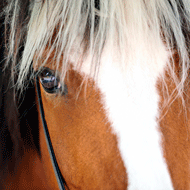Equine obesity “a rising problem”

Pleasure horses are more than twice as likely to be obese as competition horses.
Equine obesity is a rising welfare problem in the UK, according to new research published in the Equine Veterinary Journal.
The Animal Health Trust (AHT) examined risk factors that are contributing to obesity, using data collected from 785 horses and ponies between 2009 and 2011. Of these, 31 per cent were classed as obese.
According to the findings, pony breeds - particularly native breeds and heavier horses such as cobs and draught types - were significantly more likely to be obese than thoroughbreds.
Lead author Charlotte Robin says this could be down to the fact that native breeds are genetically adapted for survival in harsh conditions, “increasing their risk of obesity when maintained in an environment where food is of better quality and more readily available.”
She adds: “It is possible that in certain breeds, being overweight or obese has been normalised to a certain extent. Owners may find it easier to identify an overweight thoroughbred, compared to an overweight cob or native pony.”
AHT's research also highlights that pleasure horses are more than twice as likely to be obese than competition horses. Similarly, non-ridden horses are nearly three times more likely to be obese.
Charlotte explained: “Competition horses are likely to be managed in different ways compared to non-competition or non-ridden animals and this may also contribute to the reduced risk of obesity within this sub-population.”
World Horse Welfare funded the research. The charity's deputy head of UK support, Sam Chubbock, said: “Excess weight is one of the greatest challenges facing horse owners in the UK today... In our experience it can take three times longer to get an overweight horse back to optimum condition than it can a thin horse.
“Moreover, a previously obese horse's weight will need to be managed for the rest of its life, even after the weight has come off, and they are likely to suffer long-term effects.”
Laminitis is one of the most common health conditions linked with equine obesity. AHT will launch a new study with the Royal Veterinary College next month, to determine the management factors that may increase the risk of laminitis in equines.
Owners of laminitic and non-laminitic horses will be asked to complete monthly online diaries as part of the study, CARE about laminitis.



 The latest
The latest